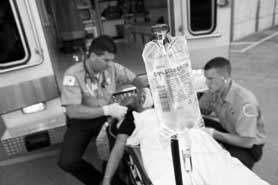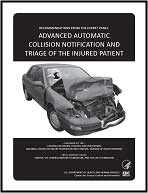Advances in Motor Vehicle Crash Response

Deciding whether a victim of a vehicle crash requires care at a trauma center is a life or death decision for emergency medical responders. Research, supported by CDC, reinforces the importance of this decision. The findings show that care at a Level I trauma center lowers the risk of death by 25% for severely injured patients, compared with treatment received at a hospital without trauma care services.
A trauma center is a type of hospital that has resources and equipment needed to help care for severely injured patients. The American College of Surgeons Committee on Trauma classifies trauma centers as Level I to Level IV. A Level I trauma center provides the highest level of trauma care while Level IV trauma centers provide initial trauma care and transfer to a higher level of trauma care if necessary.
"Providing emergency responders with vehicle crash information may help them make the appropriate field triage decisions, so crash victims can get to the right type of health-care facility at the right time," said Dr. Richard Hunt, director of the CDC Injury Center’s Division of Injury Response.
To develop procedures that will help emergency medical responders better and more quickly determine if a motorist needs care at a trauma center after a vehicle crash, CDC and the CDC Foundation recently partnered with OnStar and the GM Foundation. Through this partnership, CDC conducted a vehicle telematics initiative to develop evidence-based protocols for the emergency medical community to effectively use automotive telemetry data. By enabling responders to more quickly identify, diagnose, and treat injuries, these data will help to reduce death and injuries among vehicle crash victims.
As part of this initiative, CDC convened a panel of emergency medical physicians, trauma surgeons, public safety, and vehicle safety experts. The panel considered how real-time crash data from the advanced automatic crash notification (AACN) vehicle telematics system and similar systems can be used to determine whether injured patients need care at a trauma center. By using a collection of sensors, vehicle telemetry systems like AACN send crash data to an advisor if a vehicle is involved in a moderate or severe front, rear, or side-impact crash. Depending on the type of system, the data include information about crash severity, the direction of impact, air bag deployment, multiple impacts, and rollovers (if equipped with appropriate sensors). Advisors can relay this information to emergency dispatchers, helping them to quickly determine the appropriate combination of emergency personnel, equipment, and medical facilities.
CDC compiled the findings from the expert panel in its report, “Recommendations from the Expert Panel: Advanced Automatic Collision Notification and Triage of the Injured Patient.”

- predicting the likelihood of serious injury among vehicle occupants,
- decreasing response times by prehospital care providers,
- assisting with field triage destination and transportation decisions, and
- decreasing time it takes for patients to receive definitive trauma care.
According to the expert panel, systems like AACN may be especially important in rural or isolated areas where there may not be a passerby to report a crash and a Level I trauma center is too far away to treat the kind of injuries sustained in severe crashes.
Obtain a copy of this report

- To download, select this report [1.9 MB]
- To order the report at no cost, click here.
Learn more about field triage
Contact Us:
- Centers for Disease Control and Prevention
1600 Clifton Rd
Atlanta, GA 30333 - 800-CDC-INFO
(800-232-4636)
TTY: (888) 232-6348 - cdcinfo@cdc.gov


